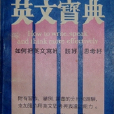基本信息
此書的第一章是《由中文學起》,認為要想把英語寫得句子簡單、意思實在而人情味十足,首先就要領會中文的奧妙才行。還有一章是《第一人稱單數》,提倡寫作時候多用“我”字,我讀後很受啟發,而且從那以後,我寫東西果真“我”字用得多了。這不能算是張揚,這只是為了文章好讀罷了。一些文章很難讀,部分原因可能是文中無“我”的緣故。
內容簡介
傅樂施對囉嗦英語的陳詞濫調深惡痛絕,曾舉了一個例子,是寫給送牛奶人的一張便條,用的是典型1960年的商用英語:
According to our agreement your company is to furnish services periodically on alternate days of the week in amounts to be specified at irregular intervals. Due to circumstances beyond our control, we herewith ask you to interrupt your services for one period only, effective Monday, May 30,1960. Please note that services are to be resumed as of Wednesday, June 1,1960, in the same amount and manner as heretofore.
其實本來的意思只是:“Please skip Monday.”(星期一別送。)
附:傅樂施的幫你寫得好的二十五信條
25 Rules of Effective Writing
1. Write about people, things, and facts.
2. Write as you talk.
3. Use contractions.
4. Use the first person.
5. Quote what was said.
6. Quote what was written.
7. Put yourself in the reader's place.
8. Don't hurt the reader's feelings.
9. Forestall misunderstandings.
10. Don't be too brief.
11. Plan a beginning, middle, and end.
12. Go from the rule to the exception, from the familiar to the new.
13. Use short names and abbreviations.
14. Use pronouns rather than repeating nouns.
15. Use verbs rather than nouns.
16. Use the active voice and a personal subject.
17. Use small, round figures.
18. Specify. Use illustrations, cases, examples.
19. Start a new sentence for each new idea.
20. Keep your sentences short.
21. Keep your paragraphs short.
22. Use direct questions.
23. Underline for emphasis.
24. Use parentheses for casual mention.
25. Make your writing interesting to look at.

